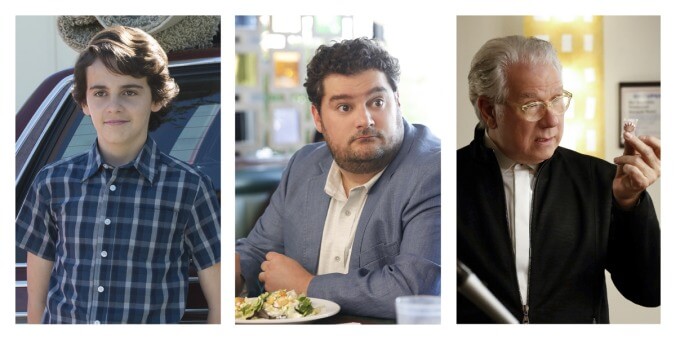The conceits and styles may change, but the enduring appeal of the American sitcom remains constant. And if there’s one thing Me, Myself, & I, CBS’s latest attempt to capture that elusive 30-minute magic, gets right about the genre, it’s that sense of breezy homespun relatability: the way that a strong exemplar of the format’s most enduring traditions will feel like it’s been there all along, even on the very first episode. And for all its multi-generational cutting through time, this show is as comfortable as an old couch, albeit one where John Larroquette sits next to you and improves everything just with his presence.
Alex Riley is an obvious sitcom type at all three stages of his life. As a kid (played by Jack Dylan Grazer), he’s the usual hyperverbal outsider, looking askance at the odd mannerisms of everyone around him while still getting into mishaps of his own making, often with the assistance of new stepbrother Justin. In his modern-day incarnation as played by Bobby Moynihan, he’s the downtrodden schlub, a guy who life has handed a series of defeats, struggling to dig himself out of the hole to provide a better world for his daughter. And as the eldest version, Alex is the born-again dreamer, having suffered a heart attack that triggers a “what’s really important” decision to retire (incredibly wealthy, by now) and figure out what to do with the rest of his life.
The youngest and oldest storylines are superior to the contemporary one, and the reasons are immediately clear. In the case of the latter, it’s the excellent Larroquette, softening his traditional wiseass persona in favor of a muted wiseguy, someone who built a successful career for himself and his daughter (really successful: He’s the CEO of a large company, and she’s the damn GM of the Chicago Bulls) and is now at a loss for the next (last?) stage of his life. He brings a warmth and soul to the role that transcends its initial wobbly writing, making his parts a standout even as they’re the smallest aspect of the premiere.
By contrast, Moynihan can pull no such tricks with his equally uneven role, still doing a lot of clumsy exposition and character backstory work in the initial episode. He’s likable enough, but there’s not yet enough to the character as written to give us a reason to root for him, save the typical emotional button-pushing of “devoted dad trying to do right by his kid.” His company, seemingly consisting of just Alex and his partner Darryl (Jaleel White), is nothing but the two longtime friends trying to invent everyday products—a process Darryl says has earned them “millions” in the past, yet Alex is living in Darryl’s garage when the show begins, which suggests one hell of a rough patch. Aside from an extreme Bulls fandom and general aw-shucks demeanor, the series has some work to do in fleshing out the present day.
But the strongest and most appealing narrative lies in the past, as the youngest arc of Me, Myself, & I is basically a reworking of The Wonder Years, and not just because Grazer looks a hell of a lot like Fred Savage. His new-kid-in-school arc is aided by an overbearing stepbrother (who could stand to be turned down a few notches in the writers room—not every precocious boy needs Gilmore Girls-level elocution) and an initial story that is instantly recognizable: the awkward encounter with a new crush. (It’s a slo-mo sequence followed by the lampshade-hanging, “Did everything just go slo-mo for a second?” he asks after first seeing her.) Freed from the weight of intervening years of experience that the show is hurriedly trying to add to the elder versions of Alex, the kids are allowed to simply inhabit a nostalgic and freewheeling world, no additional work needing to be done to make it a place audiences can feel at home within.
Based on the strength of its first episode, the show has potential to become a reliably solid presence, once it dispenses with all the burdensome exposition it feels it has to roll out far too quickly and Moynihan becomes comfortable with the contours of his character. The jokes are more bemused chuckles at this point, but the promise is there. Me, Myself, & I already feels like a comforting sitcom, easily digestible and warmly diverting. If enough people discover it, the series will have already cleared the first hurdle: We’re happy for another installment.









































